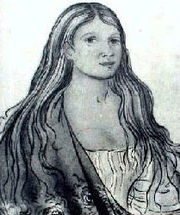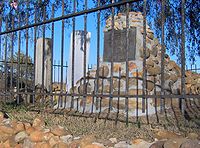
Nancy Ward
Encyclopedia

English language
English is a West Germanic language that arose in the Anglo-Saxon kingdoms of England and spread into what was to become south-east Scotland under the influence of the Anglian medieval kingdom of Northumbria...
as Nancy Ward (ca. 1738–1822/1824) was a Ghigau, or Beloved Woman of the Cherokee Nation
Cherokee Nation (19th century)
The Cherokee Nation of the 19th century —an historic entity —was a legal, autonomous, tribal government in North America existing from 1794–1906. Often referred to simply as The Nation by its inhabitants, it should not be confused with what is known today as the "modern" Cherokee Nation...
, which meant that she was allowed to sit in councils and to make decisions, along with the other Beloved Women, on pardons. She believed in peaceful coexistence
Peaceful coexistence
Peaceful coexistence was a theory developed and applied by the Soviet Union at various points during the Cold War in the context of its ostensibly Marxist–Leninist foreign policy and was adopted by Soviet-influenced "Communist states" that they could peacefully coexist with the capitalist bloc...
with European-Americans.
Beloved Woman
Nancy Ward was born in the Cherokee town of ChotaChota (Cherokee town)
Chota is a historic Overhill Cherokee site in Monroe County, Tennessee, in the southeastern United States. For much of its history, Chota was the most important of the Overhill towns, serving as the de facto capital of the Cherokee people from the late 1740s until 1788...
and was a member of the Wolf Clan. Her mother, whose actual name is not known, is often called Tame Doe and was a sister of Attakullakulla. Her father was Francis Ward "Fivekiller", a white man living in the Cherokee nation. Nancy's first husband was the Cherokee man Kingfisher. Nanyehi and Kingfisher fought side by side at the Battle of Taliwa
Battle of Taliwa
The Battle of Taliwa was fought in Ball Ground, Georgia in 1755. According to Cherokee folklore, it was mainly fought over land disputed between the Cherokees and Creek, with the Cherokees winning...
against the Creeks in 1755. When he was killed, she took up his rifle and led the Cherokee to victory. This was the action which, at the age of 18, gave her the title of Ghigau.
At age 14, Nancy Ward and her first husband Kingfisher had a daughter, Catherine. When she was 17, their son Littlefellow Fivekiller was born. After her husband and father were killed in the same battle, Nancy, who was then 18, married her father's brother, Bryant Ward, a South Carolina colonist and Indian trader, and their child was Elizabeth Ward, later to become the one-quarter Cherokee wife of General Joseph Martin
Joseph Martin (general)
Joseph Martin was a brigadier general in the Virginia militia during the American Revolutionary War, in which Martin's frontier diplomacy with the Cherokee people is credited with averting Indian attacks on the Scotch-Irish settlers who helped win the battles of Kings Mountain and Cowpens...
.
In the Revolutionary War, Ward warned the whites of an impending attack by Dragging Canoe
Dragging Canoe
Tsiyu Gansini , "He is dragging his canoe", known to whites as Dragging Canoe, was a Cherokee war chief who led a band of Cherokee against colonists and United States settlers...
, an act that has made her a Patriot for the Daughters of the American Revolution and the Society of the Sons of the American Revolution
Sons of the American Revolution
The National Society of the Sons of the American Revolution is a Louisville, Kentucky-based fraternal organization in the United States...
.
Changes to Cherokee society
As a Ghigau, Nancy had the power to spare captives. In 1776, following a Cherokee attack on the Fort WataugaFort Watauga
Fort Watauga, more properly Fort Caswell, was an American Revolutionary War fort that once stood at the Sycamore Shoals of the Watauga River in what is now Elizabethton, Tennessee...
settlement on the Watauga River
Watauga River
The Watauga River is a large stream of western North Carolina and East Tennessee. It is 60 miles long with its headwaters on the slopes of Grandfather Mountain and Peak Mountain in Watauga County, North Carolina.-Hydrography:...
(at present day Elizabethton, Tennessee
Elizabethton, Tennessee
Elizabethton is the county seat of Carter County, Tennessee, United States. Elizabethton is also the historical site both of the first independent American government located west of both the Eastern Continental Divide and the original thirteen British American colonies.Elizabethton is also the...
), she used that power to spare a Mrs. William (Lydia Russell) Bean, whom she took into her house and nursed back to health from injuries suffered in the battle. Mrs. Bean taught Nanyehi a new loom weaving technique, revolutionizing the Cherokee garments, which at the time were a combination of hides, handwoven vegetal fiber cloth, and cloth bought from traders. But this weaving revolution also changed the roles of women in the Cherokee society, as they took on the weaving and left men to do the planting, which had traditionally been a woman's job.
Mrs. Bean also rescued two of her dairy cows from the settlement, and brought them to Nanyehi. Nanyehi learned to raise the cattle and to eat dairy products, which would sustain the Cherokee when hunting was bad.
The combination of loom weaving and dairy farming helped transform Cherokee society from a communal agricultural society into a society very similar to that of their European-American neighbors, with family plots and the need for ever-more labor. Thus some Cherokee adopted the practice of chattel slavery. Nanyehi was among the first Cherokee to own African-American slaves.
Later life
Nanyehi objected to the sale of Cherokee lands to whites, but her objections were largely ignored. In 1808 and again in 1817, the Women's Council came out in opposition to the sale of more and more land.Nanyehi became a de facto ambassador between the Cherokee and the whites. She learned the art of diplomacy
Diplomacy
Diplomacy is the art and practice of conducting negotiations between representatives of groups or states...
from her maternal uncle, the influential chief Attakullakulla ("Little Carpenter"). In 1781, when the Cherokee met with an American delegation led by John Sevier
John Sevier
John Sevier served four years as the only governor of the State of Franklin and twelve years as Governor of Tennessee. As a U.S. Representative from Tennessee from 1811 until his death...
to discuss American settlements along the Little Pigeon River
Little Pigeon River (Tennessee)
The Little Pigeon River is a river located entirely within Sevier County, Tennessee.It rises from a series of streams which flow together on the dividing ridge between the states of Tennessee and North Carolina inside the boundary of the Great Smoky Mountains National Park. The river is subdivided...
, Nanyehi expressed surprise that there were no women negotiators among the Americans. Sevier was equally appalled that such important work should be given to a woman. Nanyehi told him, "You know that women are always looked upon as nothing; but we are your mothers; you are our sons. Our cry is all for peace; let it continue. This peace must last forever. Let your women's sons be ours; our sons be yours. Let your women hear our words." An American observer said that her speech was very moving.
On July 5, 1807, the Moravian mission school at Spring Place, Georgia, in the Cherokee Nation, was visited by three elderly women, including a very distinguished lady who had been a widow of fifty years and almost one hundred years old. She was described as "an unusually sensible person, honored and loved by both brown and white people." "This old woman, named Chiconehla, is supposed to have been in a war against an enemy nation and was wounded numerous times...Her left arm is decorated with some designs, which she said were fashionable during her youth...." Chiconehla stayed for two days, entertained by the students and discussing theology with the missionaries with the aid of translating by her distant relative, Mrs. James Vann (Margaret Scott). The circumstances of this high status woman leave little doubt that this Cherokee named Chiconehla was identical to the person known as Nancy Ward.
Death, burial, and remembrance

Trail of Tears
The Trail of Tears is a name given to the forced relocation and movement of Native American nations from southeastern parts of the United States following the Indian Removal Act of 1830...
. She and her son Fivekiller are buried at the top of a hill not far from the site of the inn, which is south of present-day Benton, Tennessee. In 1923 the Nancy Ward chapter of the Daughters of the American Revolution
Daughters of the American Revolution
The Daughters of the American Revolution is a lineage-based membership organization for women who are descended from a person involved in United States' independence....
, based in Chattanooga, placed a memorial marker at the grave sites near Benton, Tennessee
Benton, Tennessee
Benton is a town in Polk County, Tennessee, United States. The population was 1,138 at the 2000 census. It is the county seat of Polk County.Benton is included in the Cleveland, Tennessee Metropolitan Statistical Area.-Geography:...
. Polk County, Tennessee, where Benton is located, is trying to raise money to create a Nancy Ward Museum. The Polk County Historical and Genealogical Society currently maintains a Nancy Ward Room in their genealogy library until such a time as the museum is created.
Ward was the last woman to receive the title of Beloved Woman until the 1980s, when Maggie Wachacha was given the title.
A statue of Nancy Ward, carved by James Abraham Walker, stood in a cemetery in Grainger County, Tennessee for about 70 years before it was stolen in the early 1980s.
The Sequoyah Birthplace Museum in Vonore, Tennessee
Vonore, Tennessee
Vonore is a town in Blount and Monroe counties in the U.S. state of Tennessee. The population was 1,162 as of the 2000 census.-Geography:Vonore is located at ....
holds an annual Nancy Ward Cherokee Heritage Days celebration in her honor.
Nancy Ward is not only remembered as an important figure to the Cherokee people but is also considered an early pioneer for women in American politics as she advocated for a woman's voice during a turbulent period in her tribe's history.
Further reading
- Allen, Paula Gunn, The Sacred Hoop, Beacon Press, 1992.
- American Indian Women: A Research Guide, edited by Gretchen Bataille and Kathleen Sands, Garland Publishing, 1991.
- Green, Rayna, Women in American Indian Society, Chelsea House, 1992.
- Native American Women, edited by Gretchen M. Bataille, Garland Publishing, 1993.
- Dockstader, Frederick J., ed., Great North American Indians: Profiles in Life and Leadership. New York: Van Nostrand Reinhold, 1977
- Felton, Harold W., Nancy Ward: Cherokee. New York: Dodd Mead, 1975
- McClary, Ben Harris. "The Last Beloved Woman of the Cherokees." Tennessee Historical Society Quarterly 21 (1962): 352-64.
- Tucker, Norma. "Nancy Ward, Ghighau of the Cherokees." Georgia Historical Quarterly 53 (June 1969): 192-200
- Woodward, Grace Steele. The Cherokees. Norman: University of Oklahoma Press, 1963
External links
- SmithDRay's Nancy Ward page
- "Nanye-Hi (Nancy Ward) - Cherokee", by Julia White
- http://www.pinn.net/~sunshine/whm2002/ward.html
- Slide Show: Art Americana "Art Reviews; Red, White and Blue Americana Atop a Cultural Rainbow" by Roberta Smith, The New York Times, January 20, 2006
- Women Political Pioneers Newsweek/MSNBC.com

